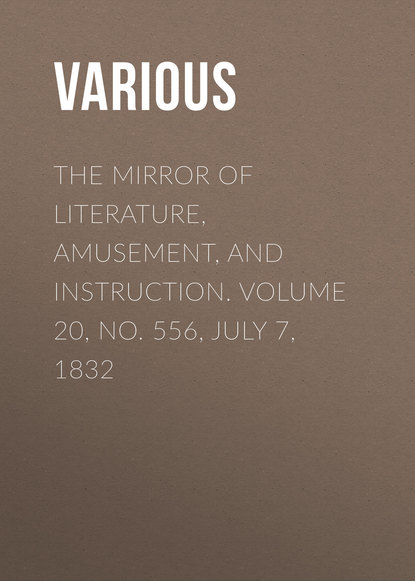 Полная версия
Полная версияПолная версия:
The Mirror of Literature, Amusement, and Instruction. Volume 20, No. 556, July 7, 1832
REX.
THE GATHERER
Early Rising.—It cannot be denied that early rising is conducive both to the health of the body and the improvement of the mind. It was an observation of Swift, that he never knew any man come to greatness and eminence who lay in bed of a morning. Though this observation of an individual is not received as an universal maxim, it is certain that some of the most eminent characters which ever existed, accustomed themselves to early rising. It seems, also, that people in general rose earlier in former times than now. In the fourteenth century, the shops in Paris were opened at four in the morning; at present, a shopkeeper is scarcely awake at seven. 8 The King of France dined at eight in the morning, and retired to his bedchamber at the same hour in the evening. During the reign of Henry VIII. fashionable people in England breakfasted at seven in the morning, and dined at ten in the forenoon. In Elizabeth's time, the nobility, gentry, and students, dined at eleven in the forenoon, and supped between five and six in the afternoon.
SWAINE.
Dick's Coffee-house, Temple Bar.—The Rev. James Miller wrote a comedy, in the year 1737, entitled "The Coffee House." "This piece met with no kind of success, from a supposition, how just (says Baker,) I cannot pretend to determine, that Mrs. Yarrow and her daughter, who kept Dick's coffee-house, near Temple Bar, and were at that time celebrated toasts, together with several persons who frequented that house, were intended to be ridiculed by the author. This he absolutely denied as being his intention; when the piece came out, however, the engraver who had been employed to compose a frontispiece, having inadvertently fixed on that very coffee-house for the scene of his drawing, the Templars, with whom the abovementioned ladies were great favourites, became, by this accident, so confirmed in their suspicions, that they united to damn the piece, and even extended their resentment to every thing which was suspected to be this author's, for a considerable time after."
P.T.W.
Heroic Women.—Browella heide or heath, is a plain in the province of Smaland, in Sweden, celebrated for being the place where the Danes were totally routed by the heroine, Blenda, who commanded the Smaland women, in defence of their husbands, who were engaged in another expedition. As a recompense for their bravery, the women of Smaland were honoured with extraordinary privileges, and wore a kind of martial head-dress; and they have still an equal share of inheritance with the men.
P.T.W.
Ancient Roundelaye for Foure Personnes.
1st. Sing we the goodfellowes roundelaye,And I the cittern will blithele playe.2nd. I'll sing tenor.3rd. The treble for me.1st. And what shalle the bass of our music be?4th. The wintry winde as it rushes and roarsAt the windowes and roofe, and the welle fast'ned doore.2nd. But the wine and the sack, and the canary are bright,They're the good fellowes starres that shine out thro' the nighte.You're a knave if you quit them till morning.1st. to 2nd. You're a knave.4th. to 3rd. You're a knave.3rd. to 1st. You're a knave.Omnes. He's a knave who forsakes them till morn.P.S. The point of this song consists in each singer being called a knave in turn.
M.L.E.
Ecstacy of Michael Angelo.—When the bronze gates of the baptistry of the church of Florence were produced, Michael Angelo cried out with emotion, at the sight of them, "that they deserved to be the gates of Paradise." Casts of these gates may be seen in the Royal Academy, London.
Power of Knowledge over Brute Force.—There is a popular story, that a student from Oxford was attacked by a wild boar, which issued from the adjoining forest of Shotover, when he escaped by cramming down the throat of the brute, a volume of Aristotle.
1
Rouchefoucault.
2
Ehrenbreitstein, signifies in German, "the broad stone of honour."
3
Germany invented gunpowder, clock-making, and printing.
4
Harrow.
5
The river Grete at Southwell.
6
Mary Duff.
7
Eddlestone, the Cambridge chorister.
8
Our correspondent is here somewhat in error: shops in Paris may be seen set out by seven o'clock in the morning.—ED. M.



